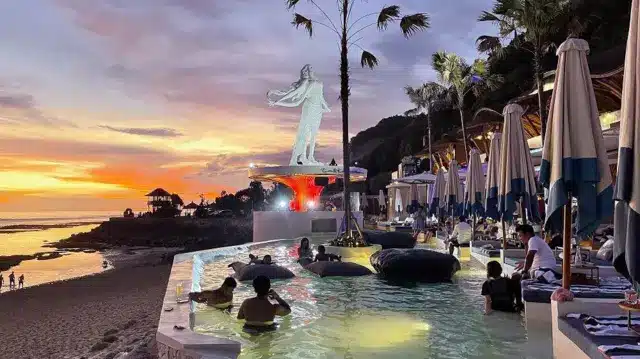Bali: The Influencer Paradise Struggling Under the Weight of Its Own Popularity

Bali, Indonesia’s renowned tropical paradise, is facing a growing wave of disillusionment among tourists who find the reality starkly different from the idyllic images often portrayed on social media. Many visitors, like Zoe Rae, have expressed their disappointment, feeling that the island does not live up to the high expectations set by online influencers. As tourism surges post-pandemic, the island grapples with overcrowding, environmental issues, and a series of recent tragedies, prompting questions about the sustainability of its tourism model.
Tourism Boom and Its Consequences
Bali has long been a favorite destination for travelers seeking a slice of paradise, with its lush landscapes, vibrant culture, and spiritual allure. However, the influx of tourists has led to significant changes on the island. In 2014, Bali welcomed 3.8 million visitors, a number that soared to 6.3 million last year, with projections indicating over seven million this year. This rapid growth has transformed the island, with many areas now characterized by bustling beach clubs and crowded streets rather than the tranquil rice fields and sacred temples that once defined its charm.
The consequences of this tourism boom are evident. Visitors often encounter congested roads, overflowing waste, and a cacophony of construction noise. The picturesque scenes shared on social media frequently mask the reality of litter-strewn beaches and long lines at popular attractions. As travelers flock to Bali in search of the spiritual haven depicted in the memoir “Eat, Pray, Love,” they are met with a different experience, leading to a growing sense of dissatisfaction among some.
Environmental Challenges and Local Impact
The environmental strain on Bali has become increasingly apparent, particularly following recent severe flooding that resulted in multiple fatalities. Local officials attribute these disasters to poor waste management and unchecked urban development. In response, the government has announced plans to restrict new construction, but many residents feel these measures are insufficient and come too late to address the ongoing challenges.
The local community is caught in a complex situation. While tourism is a vital source of income for many, the negative impacts on the environment and quality of life are becoming harder to ignore. Residents like Ni Kadek Sintya lament the loss of the island’s natural beauty, recalling quieter times when they could enjoy serene landscapes without the encroachment of development. As the island’s infrastructure struggles to keep pace with the influx of visitors, the balance between economic benefit and environmental preservation hangs in the balance.
Changing Perceptions and Cultural Misunderstandings
The disillusionment expressed by tourists like Zoe Rae highlights a broader issue of cultural misunderstanding. Many visitors arrive with preconceived notions shaped by social media, often overlooking the rich cultural heritage that Bali offers. Content creators and locals alike emphasize the importance of exploring beyond the popular tourist spots to truly appreciate the island’s diverse offerings.
Hollie Marie, a British content creator living in Bali, warns that relying solely on Instagram for insights into the island can lead to a distorted perception. She encourages travelers to engage with the local culture and explore lesser-known areas that showcase Bali’s natural beauty and traditions. This sentiment is echoed by others who advocate for a more responsible approach to tourism, urging visitors to respect the island’s customs and environment.
Efforts Towards Sustainable Tourism
In light of the challenges posed by mass tourism, there is a growing movement among locals and businesses to promote sustainable practices. Initiatives aimed at waste management, beach clean-ups, and responsible tourism are gaining traction. The Balinese government has also taken steps to address these issues, including a ban on single-use plastics and the implementation of behavior guidelines for visitors.
Despite the ongoing struggles, there is a sense of optimism among some residents. Researchers and activists believe that with the involvement of younger generations, Bali can find a way to balance tourism growth with environmental preservation. As the island navigates the complexities of overtourism, the call for responsible engagement from travelers becomes increasingly vital to ensure that Bali remains a cherished destination for future generations.
Observer Voice is the one stop site for National, International news, Sports, Editor’s Choice, Art/culture contents, Quotes and much more. We also cover historical contents. Historical contents includes World History, Indian History, and what happened today. The website also covers Entertainment across the India and World.

